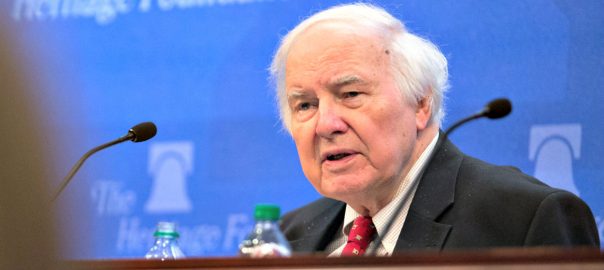Michael Novak, Rome Did Not Create Capitalism
By Richard Bennett
Michael Novak was a Catholic apologist, a novelist, and a diplomat. He is especially known for his book, “The Spirit of Democratic Capitalism.” A highlight of his career, for which he received much adulation, was his article called, “How Christianity Created Capitalism.” In 2012, it still has prominence on the “Acton” website.1 In the article, Novak alledged that the Roman Catholic Church created capitalism. For example, Novak on page one stated, “ . . . the Catholic Church of the Middle Ages was the main locus for the first flowerings of capitalism,” and “The Catholic Church’s role helped jumpstart a millennium of impressive economic progress.” In reading Novak’s statements, it appears that he was writing as a novelist, yet without any common sense. For anyone with an elementary knowledge of history knows, the Catholic Church in the Middle Ages made extravagant claims while holding entire populations in serfdom to herself. While nations that were making agricultural and economic progess like the Albigenses in France in 1203, Pope Innocent III ordered a blood-spattered campaign against them, their towns, as well as their economies. Whole villages and towns were indiscriminately butchered; thousands were burned, while others were subjected to the most hideous torture. Historical fact is that Papal Rome in the Middle Ages retarded economic growth and the well being of peoples, while during the Inquisition, from 1203 to 1800, the Church was organizing torture and death to Bible believers across the known world. 2
Then on page 1 Novak also stated, “The people of the high Middle Ages (1100—1300) were agog with wonder at great mechanical clocks, new forms of gears for windmills and water mills, improvements in wagons and carts, shoulder harnesses for beasts of burden, the ocean-going ship rudder, eyeglasses and magnifying glasses, iron smelting and ironwork, stone cutting, and new architectural principles…The church owned nearly a third of all the land of Europe. To administer those vast holdings, it established a continent-wide system of canon law that tied together multiple jurisdictions of empire, nation, barony, bishopric, religious order, chartered city, guild, confraternity, merchants, entrepreneurs, traders, et cetera. Even the new emphasis on clerical celibacy played an important capitalist role. Its clean separation between office and person in the church broke the traditional tie between family and property that had been fostered by feudalism and its carefully plotted marriages. It also provided Europe with an extraordinarily highly motivated, literate, specialized, and mobile labor force.” This is simply wordy jargon. In history, Catholicism brought into peoples lives moral degradation, indolence, and utter dependence on the Papal Church for all facets of life.
On the other hand, the Reformation brought about a spiritual and economic transformation. Peoples’ lives touched by the Reformation demonstrated a moral character, strengthened with intellectual powers. Reformation nations showed through the lives of their people skill, enterprise, sobriety, and security. The God-ordained unit of the family was the foundation for life in all its components. Novak’s ludicrous claim that “clerical celibacy played an important capitalist role” is purely a lie. Clerical celibacy in the Middle Ages had the same horrifying effects in those practicing it then as it has been exposed at the present time.
Finally, on page 3, Novak outlines the observation of the economic historian David Landes as the following, “the joy in discovery that arises from each individual being an imago Dei called to be a creator; the religious value attached to hard and good manual work; the theological separation of the Creator from the creature, such that nature is subordinated to man, not surrounded with taboos; the Jewish and Christian sense of linear, not cyclical, time and, therefore, of progress; and respect for the market.” Lande’s assessment is quite good, in fact, in what he oulined was some of the fruits of the Reformation. Novak’s thesis, however, is a most serious blockage to both biblical truth and history. Sadly, it reveals him as a dead antagonist of Papal Rome.
Our website is: https://bb.berea.edu.pl
1 Religion & Liberty Volume 10, # 3 www.acton.org/pub/religion-liberty/volume-10-number-3/how-christianity-created-capitalism The site is called after Lord Acton, a Roman Catholic historian. In fact, Acton was much shrewder than Novak; he described the Papacy as “the fiend skulking behind the Crucifix.” (Acton, Correspondence, 55; as quoted in Himmelfarb, Lord Acton, p. 151)
2 According to the historian John Dowling in his The History of Romanism “From the birth of Popery in 600, to the present time, it is estimated by careful and credible historians, that more than fifty million of the human family, have been slaughtered for the crime of heresy by popish persecutors, an average of more than forty thousand religious murders for every year of the existence of Popery. The History of Romanism Classic Reprints No. 57, Pensacola, FL: Vance Publications, 2002; originally 1845 Book 8 Ch. 1, p. 542


